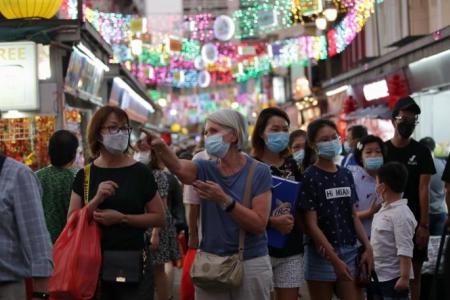Doctors say Covid-19 surge in Singapore is CNY backlog, no need for further restrictions
Doctors have called for calm after the tripling of locally transmitted Covid-19 infections on Friday (Feb 4) to 13,046 positive cases, putting it down to a backlog during the Chinese New Year period, when clinics were closed and people found it inauspicious to seek a medical diagnosis.
While the spike in numbers is at first glance alarming, doctors said the focus should remain on hospitalisation and intensive care unit (ICU) occupancy rates.
They felt the headline numbers should no longer lead to a regressive increase in social restrictions, which have caused pandemic fatigue and stopped people from fully accepting the virus as an endemic state of affairs in the new normal.
"When the clinics reopened on Thursday, there was a large backlog of cases which probably accounts for the sudden surge," said Professor Paul Tambyah, president of the Asia-Pacific Society of Clinical Microbiology and Infection.
He noted that at the National University Hospital, where he is a senior consultant, "we have seen a steady climb in the number of cases over the past few days rather than a sudden surge - that is probably because we were open all through the holiday".
Taken at face value, Friday's numbers also should not cause undue alarm. He added: "The numbers were climbing anyway and the Government's original mathematical model predicted cases reaching 13,000 a day, with later comments from ministers suggesting that we could go to 20,000-plus cases a day."
Friday's numbers more than tripled from the 4,087 cases reported on Thursday, reaching a record high.
About 80 per cent of these were identified by antigen rapid tests, indicating that they had only mild symptoms and were of low risk.
But this has still spooked some people, and there has been online speculation that social restrictions could be heightened once more.
Professor Dale Fisher, a senior infectious diseases consultant at the National University Hospital, said daily numbers should fall after Friday's "anomaly".
"The increase will resume to what we have seen over the last weeks. One has to have some sympathy for the general practitioners, polyclinics and emergency departments who would have taken the brunt of this surge in presentations after Chinese New Year," he said.
"The trigger for an increase in social restrictions should be severe disease. This Omicron wave needs to run its course so while the numbers look scary, we should focus on ICU cases, which is currently one-tenth of what it was a few months ago."
Despite the surge, there has been no corresponding uptick in the number of people hospitalised, compared with the day before.
Covid-19 patients still occupy 15, or just 4 per cent, of the 375 ICU beds available - an encouraging sign that the pandemic is under control, those interviewed said.
The doctors also said the new variants appear to be mild and fit the pattern of past pandemics where the contagion became less lethal with time.
Dr Tambyah said: "Even the deadly 1918 influenza pandemic virus which was reported to have killed one in thirty people worldwide eventually settled down to become the dominant strain of seasonal influenza from 1920 to 1957.
"There is no reason to believe that this pandemic virus is going to behave any differently."
Associate Professor Alex Cook, an expert on infectious disease modelling, said the general public need not take additional caution, although it would be wise for those who are unvaccinated or living with someone who is, to isolate themselves as much as possible.
"Friday's cases may well have been a consequence of people waiting till after Chinese New Year to visit a clinic and be formally diagnosed. While I wouldn't read too much into it, it does suggest that the current wave is still growing."
Dr Leong Hoe Nam, an infectious diseases specialist at Mount Elizabeth Novena Hospital, said that right now, getting Covid-19 is "a rite of passage for everyone living on earth".
"You have to go through it. It is unavoidable in practically all circumstances. With more clinics on board, the system should be able to cope as long as the existing precautions are kept up."
Get The New Paper on your phone with the free TNP app. Download from the Apple App Store or Google Play Store now


